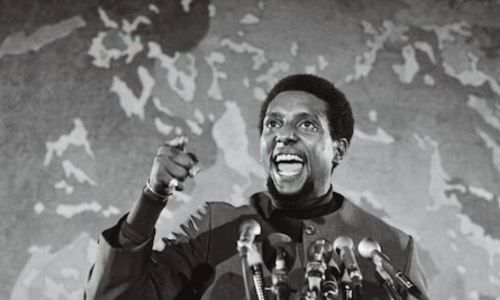The Responsibility of Love

A phrase emerges above all others in Stokely Carmichael’s reflections on his life and work: undying love. Love for those who nurtured him: parents and family; elders like Fannie Lou Hamer, Ella Baker, Martin Luther King Jr.; comrades and friends gained through movement-making reaching back to his student years. Love for a life devoted to organizing, which for Stokely meant linking arms and breaking bread; debating yet listening—as long as it took—to recognize another’s hopes and dreams; mobilizing proudly, but only when it would advance the power of those seeking a greater measure of justice and change. Love for struggle; for ongoing struggle, waged through labor, social provision, education, creativity, and the arts; for the defense of self and communities. Love for seeking what is right, even when—especially when—it required defying the authority or norms of a society unwilling to confront the crushing weight of its own contradictions. Love, finally, for the people—all people who stood for justice and humanity—but especially his people, Black people, whom he came to know in Trinidad, his birthplace, and the Bronx; at Howard University and at Parchman Farm prison in Greenwood, Mississippi and Lowndes County, Alabama; in Cuba and in Guinea. The first thing, then, to remember about Stokely was that he fought for something. And that something was what he came to know he loved.
Stokely Carmichael’s effect on history and politics was galvanic and more enduring than we in this country have appreciated. Though he led the Student Nonviolent Coordinating Committee (SNCC) for only a year, he was among its most enthusiastic and effective members in advocating for the prioritization of organizing over mobilizing. His was a program of building relationships, seeking consensus around goals and tactics, and sustaining participation and commitment, especially in the face of threats to safety. That exemplifies the ordinary history of the Freedom Movement: the day-today struggle that mattered most to the nameless thousands who participated, too often forgotten in the face of the legend and clutch of deities we index as epitomizing the civil rights movement today.

Stokely is often counted—and criticized—as one who sought to become larger than life. But that reflects how he came to be called out of his name, and contributions by the state, the media, and a general public averse to his vision of change. His participation in the controversial 1966 Mississippi March Against Fear, where he supposedly sundered the civil rights coalition, saw the registration of over five thousand new Black voters—a fact often overlooked in the historical record. The idea thought to have introduced those divisions—Black Power— provided a talisman to Black youth in the U.S. and globally. It inspired leaders and grassroots organizers in Cuba and decolonizing African nations while helping scale up political consciousness and activism within Black Caribbean communities in Britain and apartheid South Africa. Back in the U.S., the idea was dismissed as quixotic and even reactionary. Older and wiser figures at the time—Toni Morrison, C.L.R. James, Shirley Graham DuBois, and Kwame Nkrumah, to name a few—recognized the concept’s transformative value and cherished it as historic in meaning. Their assessment was that Stokely had not fallen out of step with his times. Rather, he had quickened the stride of an entire era.
We cannot reclaim this version of Stokely Carmichael unless we refuse the caricatures that have redacted him from history and memory. Doing so requires not confusing his spirit and passion with blinding anger, and recognizing his egalitarianism, rather than uncritically recycling his reputation for demagoguery. It requires consulting those who struggled with him and cared about him. The writer Nambi E. Kelley offers us the opportunity to recover this Stokely Carmichael with her play Stokely: The Unfinished Revolution.
In its form, content, and—most of all—its profound feeling, it recalls Stokely Carmichael as he lived: brilliant, unafraid, caring, and ever-inspired. His story, reconstructed here through both his experiences and those closest to him (particularly the women who mattered most in his life), reminds us of the opportunity and responsibility to tell our stories as we know and feel them so they can sustain our capacity to love, in life as well as in struggle.
Adam Green, PhD is an Associate Professor in Departments of Race, Diaspora and Indigeneity, and History, at the University of Chicago. He received degrees the University of Chicago and from Yale University.
Author of Selling the Race: Culture and Community in Black Chicago, 1940-1955 (Univ. of Chicago Press: 2006), he also co-edited Time Longer than Rope: Studies in African American Activism, 1850-1950 with Charles Payne (New York University Press: 2003). His current research addresses the Black struggle for happiness and its relationship to Black ethical ambition and human capability.
Adam has worked extensively on projects joining public history and social change, including the Chicago Torture Justice Memorial Project, the campaign to mark the site of the 1961 Rainbow Beach Wade-In, as faculty partner for the Chicago Section of the Obama Presidency Oral History Project, and as a member of the City of Chicago’s Monuments Project. He is currently cochairing the Council on University/Community Relations, examining the University of Chicago’s historical, contemporary and future relations to surrounding South Side communities.
1 response on “The Responsibility of Love”
Comments are closed.
Thank you for that informative representation of Stokely’s impact on Aricans in the diaspora and Africa.